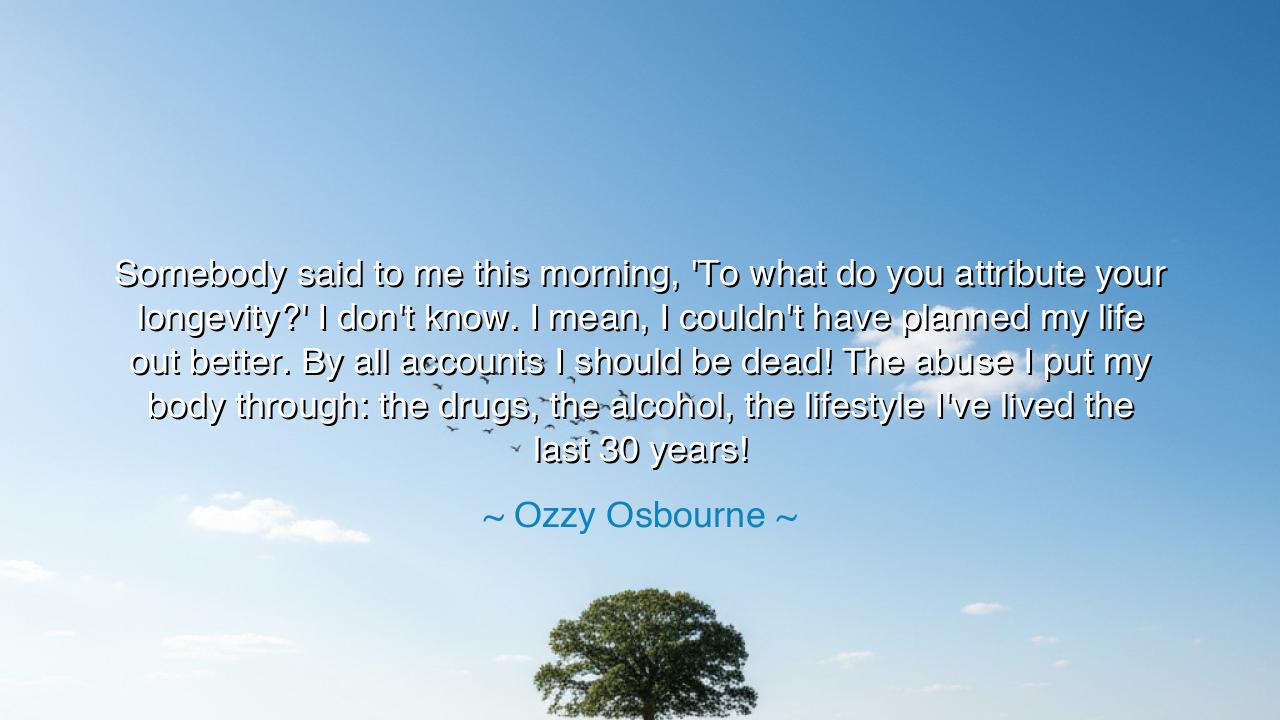
Somebody said to me this morning, 'To what do you attribute your
Somebody said to me this morning, 'To what do you attribute your longevity?' I don't know. I mean, I couldn't have planned my life out better. By all accounts I should be dead! The abuse I put my body through: the drugs, the alcohol, the lifestyle I've lived the last 30 years!






In the twilight of his years, when the fires of youth had long burned through the body, Ozzy Osbourne uttered words both trembling with truth and blazing with mystery: “Somebody said to me this morning, ‘To what do you attribute your longevity?’ I don’t know. I mean, I couldn’t have planned my life out better. By all accounts I should be dead! The abuse I put my body through: the drugs, the alcohol, the lifestyle I’ve lived the last 30 years!” These words are not merely the lament of an aging rocker, but the cry of a man astonished by his own survival. It is a confession, an admission, and a revelation all in one—a glimpse into the paradox of human frailty and divine mercy.
For in these words, we hear the battle-song of mortality. Here stands a man who wrestled with destruction, who poisoned his own temple with excess, and yet remains upright while others have fallen. It is as though fate itself, or perhaps some hidden hand, preserved him against reason. This astonishment is not unique to Osbourne; it echoes through the ages. How many warriors, drunk on glory, survived wounds that should have slain them? How many wanderers stumbled through the deserts of despair, yet emerged alive when others perished? Longevity, then, is not always the fruit of virtue, but sometimes the strange gift of chance, destiny, or providence.
Let us recall the tale of Alexander the Great. He lived a life of conquest, driving himself and his armies to exhaustion, drinking deeply, feasting heavily, and pushing the human frame beyond its limits. By all accounts, such a life should have been short, yet for a time he seemed untouchable, shielded by fortune itself. Though Alexander died young, his span outstripped the natural law of moderation, and his legend survived far longer than his flesh. So too with Ozzy: his body, by nature’s laws, ought to have crumbled under the weight of his choices, yet his name lives on, carried by the strange winds of endurance.
The words also speak of humility, though clothed in astonishment. He does not credit discipline, nor wisdom, nor any deliberate plan. He says plainly: “I don’t know.” This is wisdom disguised as ignorance. For many men believe their strength to be of their own making, and they boast of routines, diets, or philosophies. But Ozzy, in his raw honesty, reveals a deeper truth: survival is sometimes beyond our comprehension. The breath in our lungs is not always earned; sometimes it is given, unmerited, like a spark that refuses to die even when drenched in water.
Yet in this confession, there is also a warning. For though he stands alive, he acknowledges the abuse: the drugs, the alcohol, the reckless lifestyle. These are not banners of pride, but scars of folly. Many who walked the same path did not see their hair turn gray, nor their children grow. For every survivor like Osbourne, there are countless others buried in silence, their stories cut short. Thus, his astonishment is both miracle and caution. Longevity gained despite abuse is not a model to imitate, but a reminder of how fragile life is, and how easily it might have been otherwise.
From this, let future generations learn: do not squander the gift of the body. Do not test fate with arrogance, for while one man may endure beyond reason, many more will perish before their time. Instead, let the miracle of survival inspire gratitude. Each breath is not guaranteed; each morning is not promised. Therefore live with reverence for the body, care for the vessel that carries your soul, and walk the middle path between joy and destruction.
Practically, let each person take this teaching into their life: cherish moderation. Celebrate, but not to excess. Rest, but do not fall into sloth. Honor your flesh, for it is the dwelling place of your spirit. And when you rise in the morning, whisper words of thanks that you have been granted yet another day. For whether your years are many or few, their true measure lies not in their length but in their depth, their meaning, their love.
Thus, let Ozzy’s words ring in the ears of all who hear them: longevity is not always deserved, but always precious. Do not tempt fate with needless ruin, but honor the life that has been given you. And should you find yourself, like him, still standing when by all accounts you should have fallen, let your survival not be a boast but a vow: to use your remaining days with wisdom, with gratitude, and with reverence for the miracle of life.






AAdministratorAdministrator
Welcome, honored guests. Please leave a comment, we will respond soon